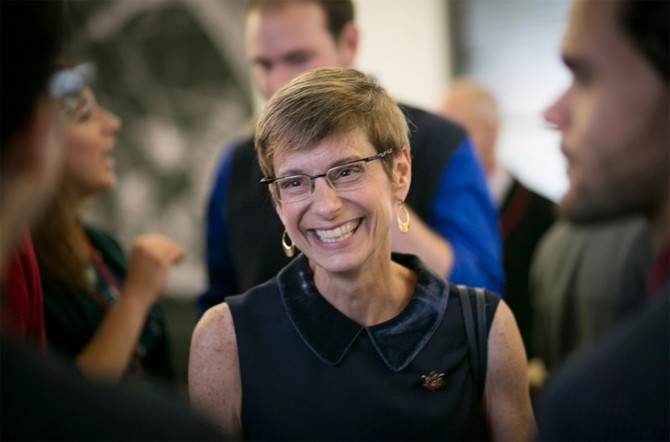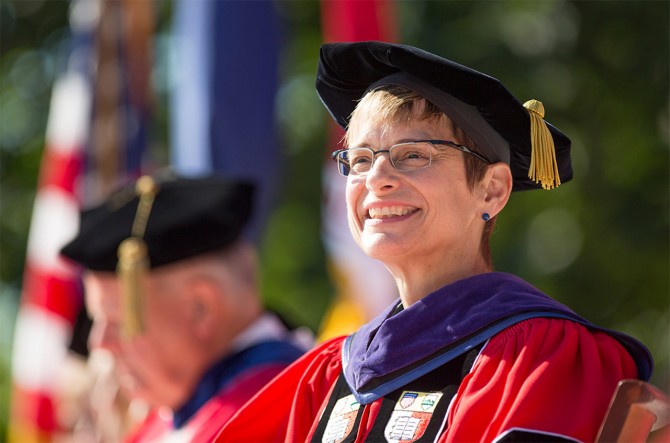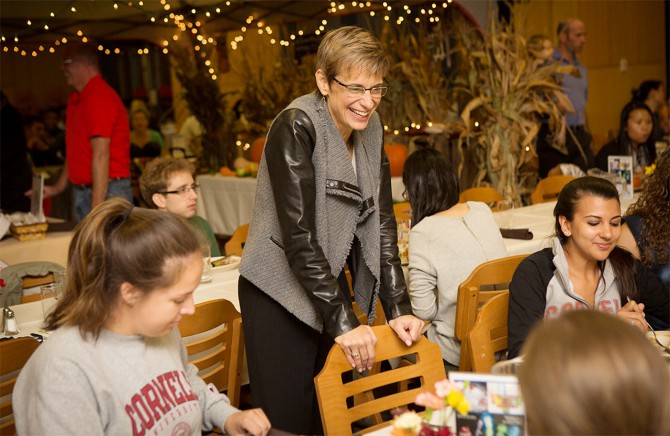President Elizabeth Garrett dies of colon cancer at age 52
By Joe Wilensky
Cornell University President Elizabeth Garrett died March 6 from colon cancer. She was 52.
“Our president, colleague and friend, Elizabeth Garrett, passed away late last evening after a brave battle with colon cancer,” Robert S. Harrison ’76, chairman of the Cornell University Board of Trustees, said in a message sent to the university community March 7. “There are few words to express the enormity of this loss.
“Beth was simply a remarkable human being – a vibrant and passionate leader who devoted her life to the pursuit of knowledge and public service and had a profound, positive impact on the many lives that she touched. In this regard, she was the quintessential Cornellian. From the moment I met her during the presidential search, it was clear to me that she had the intellect, energy and vision not only to lead Cornell, but to be one of the greatest presidents in our 150-year history. While Beth’s tenure as president has tragically been cut short, her efforts over the last eight months have set the university on a path toward continued excellence. She will leave a lasting legacy on our beloved institution and will be terribly missed.”
Garrett is the first Cornell president to die while in office. She began her tenure as the 13th president July 1, 2015, during the university’s sesquicentennial year. Her inauguration on Sept. 18 as Cornell’s first female president was a celebratory milestone, and she already had made a striking impact on the university.
“Beth was an inspiring and visionary leader who continually raised the bar for all of us at Cornell as we charted the university’s future together,” said Michael Kotlikoff, acting president and Cornell provost. “Her greatest legacy will be for this generation of Cornellians – faculty, students and staff – to build on Beth’s fearless dedication to discovery and learning, and her incredible energy to make her vision for Cornell University’s future a reality.”
Kotlikoff continued, “We are all deeply saddened by her passing, and I extend my profound condolences to her husband, Andrei Marmor, to her family, and to the community of thousands and thousands of Cornellians, here in Ithaca and around the country and the world.”
There will be a universitywide moment of silence today, March 7, at 4 p.m., Harrison said, followed by sounding of the Cornell Chimes. A memorial gathering will be Thursday, March 17, at 3 p.m. in Bailey Hall.
Garrett first shared her cancer diagnosis with the Cornell community Feb. 8 in a statement. She underwent surgery Feb. 19, naming Kotlikoff acting president. On Feb. 22 it was announced that she had been released from intensive care and would continue treatment.
Priorities shared at inauguration
During her inaugural address, “The Road to Ithaka: Full of Adventure, Full of Discovery … The Marvelous Journey,” Sept. 18, 2015, Garrett likened Cornell University to a state of mind and a spirit of lifetime journey, repeatedly returning to the text of C.P. Cavafy’s poem about Ulysses’ journey home. She stressed the importance of the faculty as the foundation of the university; students as partners in the voyage of discovery and making a difference in the world; and the growing Cornell Tech campus in New York City that gives Cornell something no other leading American university has – an established home in a quintessential college town and also a substantial footprint in an international urban center.
She described how she planned for the university to focus, in the upcoming months, more intensely on both the residential undergraduate experience and on defining, as a community, the shared intellectual experience all Cornell students should encounter.
In her first State of the University Address the following month, Garrett highlighted the continuing growth of Cornell’s global footprint and listed her top priorities for the university: attracting and retaining top faculty; increasing government research funding, corporate strategic partnerships and philanthropic support for research and creative work; investing in key academic areas that have broad impact; enhancing the student learning and living experience; and broadly increasing cross-campus connections.
She added that Cornell was on track to hire 80-100 new faculty in the 2015-16 academic year and described the university’s upcoming strategic planning process and how it will inform decisions about where to invest at the university level. Some areas already were apparent, Garrett said, identifying sustainability and energy, the visual and performing arts, materials science and engineering, and entrepreneurship.
She also described how existing and new academic initiatives, for graduate and professional students as well as undergraduates, already were improving the Cornell student experience, from new degree programs to global learning opportunities and the Engaged Cornell initiative.
Concluding her State of the University Address, Garrett quoted Cornell’s third president, Jacob Gould Schurman, who said Cornell is “at once realistic and idealistic … always in quest of something better.” She challenged the audience, “as both idealists and realists,” to build on the “visionary purpose” of Ezra Cornell and Andrew D. White and, together, “take Cornell to an even higher level of excellence and global influence.”
Among her initiatives was the creation, announced this January, of an integrated Cornell College of Business that will comprise the university’s three accredited business schools. Established by the board of trustees, the process of how the college will be created and structured began over the past two months through meetings and forums with stakeholders.
Garrett’s career before Cornell
Garrett was appointed to the provost and senior vice president position at the University of Southern California in October 2010. As the university’s second-ranking officer, she oversaw the USC Dana and David Dornsife College of Letters, Arts and Sciences as well as the Keck School of Medicine of USC and 16 other professional schools, in addition to numerous divisions. She also was involved in the Keck Medical Center of USC and sat on the health systems board overseeing three hospitals and 18 clinical practices.
At USC, she was the Frances R. and John J. Duggan Professor of Law, Political Science, Finance and Business Economics, and Public Policy; she had served previously as USC’s vice president for academic planning and budget.
Garrett’s primary scholarly interests included legislative process, the design of democratic institutions, the federal budget process and tax policy. She was the author of more than 50 articles, book chapters and essays, and is co-author of the nation’s most influential casebook on legislation and statutory interpretation.
In 2005, U.S. President George W. Bush appointed her to serve on the nine-member bipartisan Advisory Panel on Federal Tax Reform. From 2009 to 2013, she served as one of five commissioners on the California Fair Political Practices Commission, the state’s independent political oversight agency, and was a co-chair of its Subcommittee on the Political Reform Act and Internet Political Activity.
Before joining the faculty of USC, she was a professor of law at the University of Chicago, where she also served as deputy dean for academic affairs. She received her B.A. in history with special distinction from the University of Oklahoma and her J.D. from the University of Virginia School of Law. Before entering academics, Garrett served as budget and tax counsel and legislative director for Sen. David L. Boren (D-Okla.) and clerked for Justice Thurgood Marshall on the U.S. Supreme Court.
Garrett is survived by her husband, Andrei Marmor, Cornell professor of law and philosophy, and two stepdaughters; her parents, Robert and Jane Garrett; and a sister, Laura Gruntmeir.
Memorial funds established
The Marmor and Garrett families ask that memorial gifts be directed to either Student Scholarships in memory of President Elizabeth Garrett, in support of students with need on the Ithaca campus, or to the President Elizabeth Garrett Fund for Colon Cancer Research at Weill Cornell Medicine.
Gifts to either fund can be made online, by calling 1-800-279-3099, or by mailing a check to Cornell University, P.O. Box 25842, Lehigh Valley, PA 18003-9692.
(Updated March 10, 2016, 10 p.m.)
Media Contact
Get Cornell news delivered right to your inbox.
Subscribe

